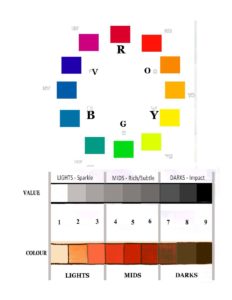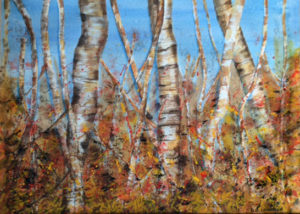It is obvious to sat here are many ways to paint. However, “Color as Tone” is a fundamental way that will develop all your color abilities. Whether you are a beginner or even a more experienced painter it is valuable to re-visit this skill concept. I don’t claim originality here – many painters use this concept one way or another. It works for all genres including abstraction.
First, revisit the idea that Color has three main CONTRASTS:
HUE – basically the way we ordinarily name colors, red-yellow-blue, etc. These create different color temperatures, relative warms and cools.
INTENSITY – also called ‘brilliance’, ‘purity’, or ‘saturation’ – so you can have a relatively brilliant red or a subtle rusty rose, a brilliant blue or a dull grayish blue, a brilliant yellow or a muted beige-yellow, etc.
TONE – the lightness or darkness of a color compared to a nine-step scale of grays. So, we can have a dark blue (about ‘8’ on a gray-scale or a light blue about ‘3’ on a gray-scale, and so on for all the hues)
When you buy paint it will have a combination of these three contrasts in the tube. It will have one more contrast: ‘personality’, which comes from the pigment that made the particular paint, such as ultramarine blue versus cobalt blue. Here, I am concerned with the main three contrasts of Hue, Intensity, and Tone.
It is great fun to splash around with various hues and intensities and many fine paintings use each these qualities for their own sake as the main issue. BUT – if you want to get a good grip on the use of color, first focus on COLOR AS TONE and master it. Most paintings can be read very well as a black and white photo. Suppose you paint an image carefully as a black-white or as a monochromatic ‘under-painting, eg. Portrait, still-life, landscape or abstraction . You can then be quite playful painting over it with various, even arbitrary or random, hues and have a very interesting color painting, as long as you MATCH THE TONES of the grays that are in each area of the under-painting (also called a “grisaille”). In fact, a great many paintings were done in this way prior to the availability of cheaper paint in the 1800’s. So this course is going to focus specifically on seeing and using COLOR AS TONE. When you master this idea, you will have a very important tool
This is a sequence that I often use when employing the Tonal Design Process. I do this directly in color, but they could be done as grisailles and then adding color over. If I do as an under-painted grisaille I usually do it in tones of blue, which I find works best when applying other hues over. Also, Column 4 shows examples of ‘grisailles’ in each major genre. The top three were done as watercolors, The last one is acrylic. But all can be done this way in any medium:


